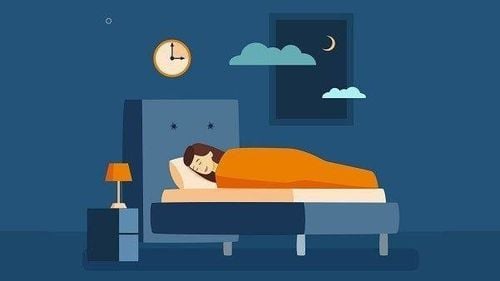This is an automatically translated article.
New research shows that poor quality sleep may be linked to brain gray matter shrinkage over time. So how does sleep affect the brain?
1. How does sleep affect the brain?
A faster decline in three parts of the brain was found in most older adults with poor quality sleep, although not necessarily with too little sleep. Difficulty sleeping includes difficulty falling asleep, waking at night, or waking up too early.
However, it is not clear to researchers whether poor quality sleep definitely causes changes in the brain, whether brain shrinkage causes poor quality sleep, or both. These conditions all occur at the same time.
Lead researcher Claire Sexton - a postdoctoral research assistant at the University of Oxford said that humans spend about a third of their lives sleeping, and sleep is considered "the brain's housekeeper", helping the brain recovery and repair.
If sleep is disrupted, the processes that help restore and repair the brain are also disrupted or work less efficiently, leading to a greater rate of decline in brain volume. However, it is possible that a deterioration in the brain also contributes to difficulty sleeping. It's possible that a greater rate of brain volume decline makes it harder for a person to get a good night's sleep, so this problem could go both ways.
Sexton and her colleagues scanned the brains of 147 Norwegian adults, average age 54 at the start of the study, who underwent 2 brain scans, once at the start of the study and once on average. three and a half years on average. At the time of the second scan, the participants also filled out a questionnaire about their sleep quality, including duration and level of sleep, time it took to fall asleep, how long actually slept, how often how often they wake up each night, how sleepy they are during the day, and whether they use sleeping pills. The researchers found that the participants took an average of 20 minutes to fall asleep and slept an average of 7 hours per night.
After making adjustments for the participants' physical activity, weight, and blood pressure, which have been shown to affect sleep quality, the researchers compared the changes Changes in the participants' brain scans and reported their findings were as follows: In people with poor sleep quality, the researchers found shrinkage in part of their prefrontal cortex (brain shrinks) and some parts have atrophy or decline in other parts of the brain, including parts of the brain involved in reasoning, planning, memory, and problem-solving.
The study did not test the thinking skills of the participants, so it cannot prove that poor sleep or brain shrinkage is associated with poor memory or difficulty concentrating. However, there have been previous studies that have found a link between memory impairment and decreased brain volume.
Anton Porsteinsson, director of Alzheimer's Care, Research and Education at the University of Rochester School of Medicine and Dentistry, says we often associate brain shrinkage, brain shrinkage, and brain tissue loss. that doesn't help as the body ages. Meanwhile sleep disturbance is a common symptom in the general population and it usually gets worse as the body ages. A growing body of data suggests that sleep disturbances may be a risk factor for poor outcomes in assessments of brain cells and other medical problems. The correlation is just poor sleep quality, not shorter sleep. The study found that a reduction in brain size in poor sleepers was seen at all ages, but the correlation was stronger in adults over 60.

Giấc ngủ kém chất lượng có thể liên quan đến sự co rút chất xám của não theo thời gian
2. Tips for a good night's sleep
So good bedtime and good sleep habits are very important, whether it is natural sleep or using drugs to enhance sleep, but it is best to have a habit of going to bed at the same time. one time every night. Other tips for a good night's sleep include keeping electronic devices like smartphones and tablets out of the bedroom, avoiding email right before bed, and increasing physical activity in the morning. day, avoid caffeine near the end of the day.
More future studies are needed to test whether improving people's sleep quality can slow the rate of brain mass loss. If that's the case, improving people's sleep habits could be an important way to improve brain health.
Follow Vinmec International General Hospital website to get more health, nutrition and beauty information to protect the health of yourself and your loved ones in your family.
Please dial HOTLINE for more information or register for an appointment HERE. Download MyVinmec app to make appointments faster and to manage your bookings easily.
References: sleepeducation.org, ncbi.nlm.nih.gov, webmd.com













